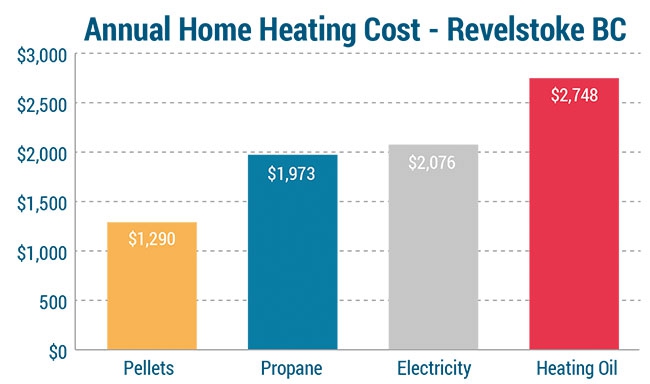
Heating with pellets
February 9, 2015
By Gordon Murray
Feb. 9, 2015 - My column usually focuses on marketing, trade, and policy issues facing the Canadian wood pellet sector. For a change, I thought readers might find it interesting to hear about my personal experience as an ardent user of wood pellets for home heating.
 My column usually focuses on marketing
My column usually focuses on marketingI live in Revelstoke, a community of about 7,200 people nestled in the Columbia Mountains of southwest British Columbia. Due to our low population and surrounding mountainous terrain, Revelstoke is not served by natural gas. The most common home heating energy sources are propane, electricity, wood pellets and heating oil.
I recently installed a new 35,000 BTU wood pellet stove on the main floor of my 1,800 square foot house. Although I have propane and electric backup, my pellet stove heats my entire house. The stove and chimney liner cost $4,734 including tax and I paid a WETT-certified technician $650 for installation; total cost, tax included was $5,384.
Most will agree that wood heat is special. It has an ambience and coziness that can’t be matched by propane, electricity or oil. And since wood pellets are cheaper than other forms of energy, I don’t mind when my wife wants to keep the heat up high.
Operating and maintaining my pellet stove is easy. I buy pellets – about ten bags at a time, which is all that fits in my car – and store them in my garage. Due to the stove’s small hopper size, I fill it twice daily. It takes me about one minute each day to fetch the window spray and wipe the stove glass clean so we can enjoy the pellet flame. Once a week I need to spend about 10 minutes cleaning ash from the inside of the stove and emptying the ash pan.
Other than the cozy heat, the next most attractive feature of my pellet stove is the low operating cost. In Revelstoke, pellets cost $5.24 per bag or $262 per tonne. This works out to $15.41/ gigajoule (GJ). Add $0.50 /GJ to operate the stove’s auger and fan for a total pellet cost of $15.92/GJ. This compares with $24.36/GJ for propane (including delivery, carbon tax and electrical fan); $29.47/GJ for electricity; and a whopping $33.93/GJ for heating oil.
Revelstoke has a cool winter climate; from November to February the average daily temperature is about -5°C. From my old propane bills, I know that my home uses about 0.7 GJ/day of heat energy (including heating appliance efficiency losses) during the coldest part of the winter. Annually my house requires 81 GJ of heat energy – equivalent to 4.8 tonnes of wood pellets. So now, on the coldest winter days, I spend $11.14/ day for wood pellets. If I used propane, it would cost $17.05/day; electricity (adjusted for greater energy efficiency) would cost $17.94/day; and heating oil would cost $23.75/day. On an annual basis, pellets will cost $1,290; propane would cost, $1,973; electricity, $2,076; and heating oil, $2,748.
The only drawback of installing a pellet stove is the relatively high upfront cost. My stove, including installation, cost $5,384. The City of Revelstoke administers the provincially-funded Woodstove Change-out Program that pays a rebate of $500 to homeowners who replace old inefficient wood stoves with new EPA/CSA certified high-efficiency pellet, wood or gas stoves. Unfortunately, since I changed a gas stove for a pellet stove, I did not qualify for this rebate.
The annual savings from using wood pellets instead of propane is $683, yielding a simple payback of 7.9 years.
I am happy with my pellet stove. I like the ambience and cozy heat. It operates automatically and requires infrequent filling. Maintenance is very easy. And pellets are cheaper than such alternatives as propane, electricity and heating oil. I am grateful that I was able to afford the cost of purchasing and installing my stove. However, lower -income families may not have the same ability. Moreover, they may not be willing to accept a 7.9 year payback period. Nevertheless, wood pellets provide the best heat and are the lowest cost energy source in my hometown, Revelstoke, and in many other Canadian communities.
Editor’s note: Learn more about wood pellet heating in Canada at woodpelletheat.ca.
Print this page